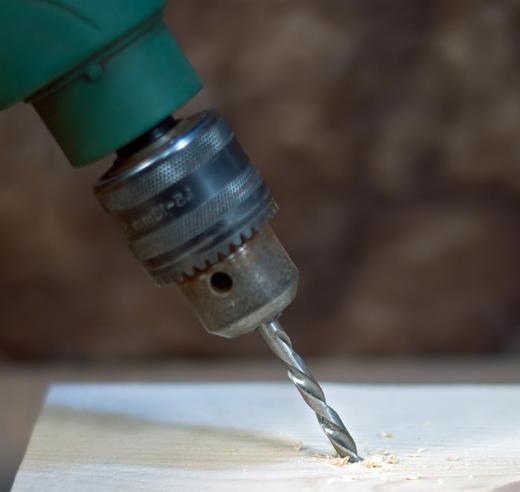A compact drill is a drill that has been designed to fit into tight spaces where ordinary drills cannot fit because of their bulk. Compact drills are used by plumbers, electricians, and other contracting professionals when they are working in environments with limited room. This can include settings like inside cabinets and cupboards, around joists and other supports, and so forth. Many hardware stores carry compact drills along with accessories such as bits, spare batteries, charging stations, and carrying cases.
The design of a compact drill is sleek and slim so it will fit in as many spaces as possible. Some have heads that can be rotated so the user can change the angle of drilling, if necessary. Other features that can be useful include attached flashlights to illuminate the workspace, and magnetized heads to hold screws in position while the drill is in use. Often, the design can be operated one handed, cutting down on the space needed to run the drill successfully and safely.

Some compact drills are cordless, while others are corded. A corded compact drill usually has more power and is slower to wear out. The disadvantage is that a power source is needed, along with room to run the cord, and this can be a nuisance on some job sites. Cordless drills are more convenient to use, although the batteries wear down and they are usually not as powerful as their corded counterparts. This can be inconvenient when working with tough materials and the short battery life can be a problem unless spares are kept charged and available.

Compact drills can accept a variety of heads, using various mechanisms to lock heads into place so they will be stable during drilling. They have forward and reverse gearing, and some allow for variable speed. Certain tasks may require more or less speed and this option on a compact drill can be useful for some types of work.
In addition to being convenient for tight workspaces, a compact drill can also be useful for people who want lightweight tool kits for basic construction tasks. Such drills take up less room and are less weighty than standard drills and can be stored in a toolbox for easy access or carried on a tool belt relatively easily. Ready access to tools can make workplaces more efficient by reducing the amount of time spent getting tools out of storage for specialty tasks.
Ever since she began contributing to the site several years ago, Mary has embraced the exciting challenge of being a About Mechanics researcher and writer. Mary has a liberal arts degree from Goddard College and spends her free time reading, cooking, and exploring the great outdoors.

